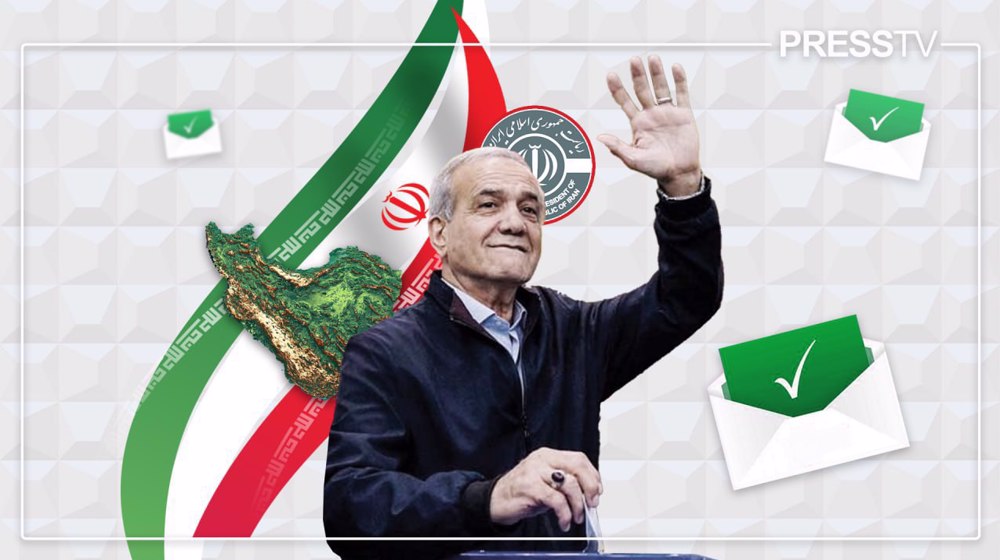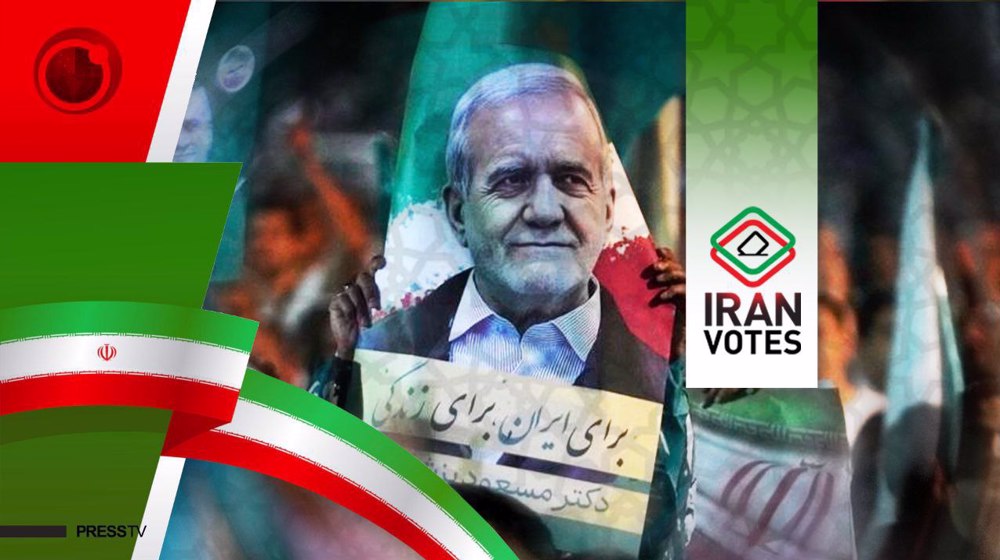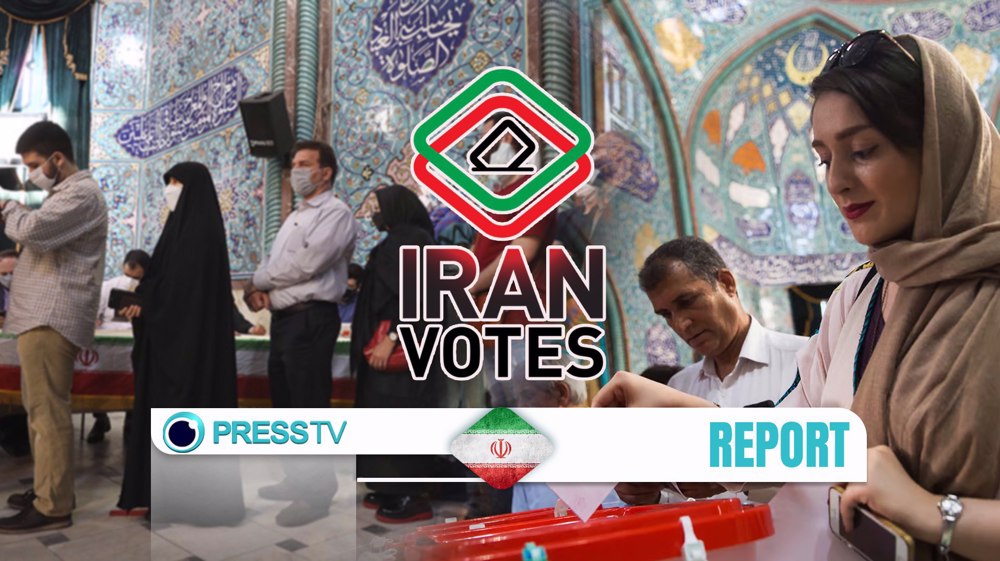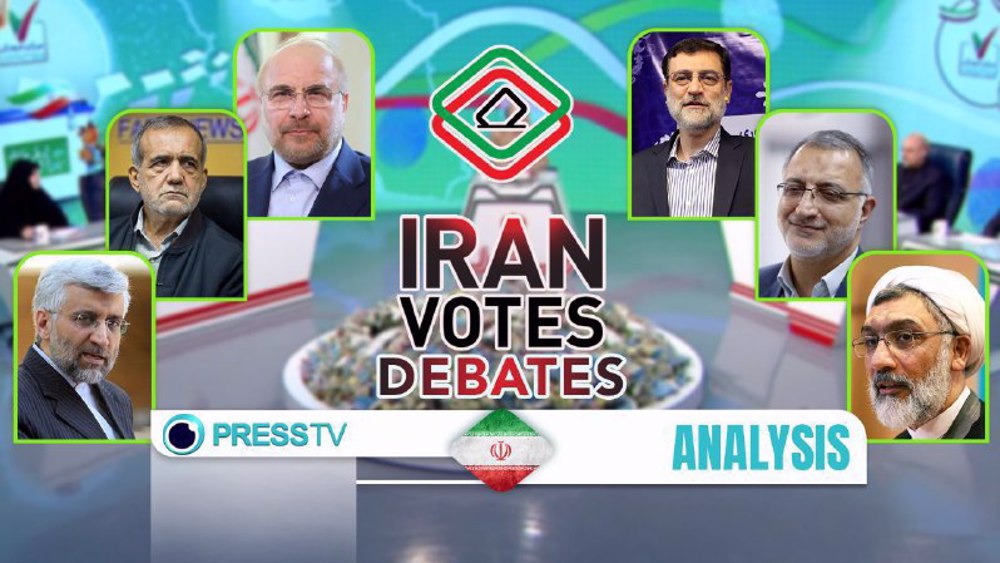Analysis: How presidential hopefuls outlined economic, social welfare plans in 2nd debate
By Alireza Akbari
Six candidates in a race for the presidency of the Islamic Republic of Iran unveiled their comprehensive economic and social welfare blueprints during the second televised debate on Thursday.
It was the second of five debates aired live by the Islamic Republic of Iran Broadcasting (IRIB).
Campaigning for the June 28 snap presidential election has been in full swing with candidates leaving no stone unturned to impress the electorate with their plans and manifestos.
The second televised debate commenced with the remarks of the Leader of the Islamic Revolution, Ayatollah Seyyed Ali Khamenei, emphasizing the virtues of discipline, and moral and ethical conduct.
As the Leader elaborated, the ethos that defines the Islamic Republic's electoral milieu is starkly in contrast withwhat happens in the West, especially the political campaigns in the US.
The second live televised debate focused on economic roadmaps conceived by the presidential hopefuls for advancing justice-centric social amenities, scrutinizing their proposals encompassing healthcare, education, and the scientific apparatus.
The first televised debate on Monday was centered on combatting inflation, fostering the private sector, stimulating production, and encouraging greater public participation in the economic sphere.
The 240-minute debate followed the same format underpinned by four distinct segments.
The second televised debate witnessed a minor change, with both voters and subject experts putting up a rigorous examination of thestrategies proposed by the presidential contenders.
Segment 1:
The first segment focused on the theme of economics entwined with justice-driven services. Candidates in the fray delved into their stances on the issues of poverty alleviation and subsidy management.
The inquiries during the initial segment revolved around subsidies, their fair allocation to either producers or consumers, and candidates’ blueprints to combat the scourge of poverty.
During his allotted eight minutes, Amir-Hossein Ghazizadeh Hashemi, a former lawmaker and a second-time presidential hopeful, espoused a paradigm anchored in “domestic prowess.”
Unveiling his agenda, Ghazizadeh Hashemi advocated for the transfer of governmental assets to the Iranian populace while proposing “revisions to the subsidy legislation.”
Citing his work as the head of the Foundation of Martyrs and Veterans Affairs, the candidate underscored the restitution of assets to martyrs’ families and championed a comprehensive energy sector overhaul to rectify prevailing disparities.
Mohammad Baqer Qalibaf, a veteran political figure and parliament speaker, posited that the onus rests on the incoming president to safeguard “familial purchasing power.”
Arguing for “consumer-centric subsidy disbursement” and “commensurate salary increments” to offset inflationary spikes, Qalibaf championed the implementation of a holistic healthcare insurance system and targeted energy consumption.
Meanwhile, Mostafa Pourmohammadi, a former minister who also held senior posts in the judiciary, underscored the cardinal principle of “justice” in subsidy distribution as a lynchpin of societal equity.
Stressing the imperative of empowering marginalized sections of society, Pourmohammadi called for inclusive welfare provision.
Alireza Zakani, the mayor of Tehran and former lawmaker, delineated a sweeping “welfare package” for the Iranian populace encompassing healthcare and social provisions.
Advancing the concept of a "golden subsidy" grounded in bestowing a fixed gold equivalent per family unit to obviate inflationary pressures, Zakani envisioned a plan towards poverty eradication through prudent energy consumption measures.
Masoud Pezeshkian, a former health minister and seasoned lawmaker, highlighted the imperatives of inflation control, and energy conservation through public education initiatives.
Advocating for the cohesive implementation of Ayatollah Seyyed Ali Khamenei's directives, Pezeshkian called for an approach anchored in “unity and collective vision.”
Saeed Jalili, a former lead nuclear negotiator and head of the country’s top security body, advocated for judicious resource allocation and consumption management devoid of corruption.
Emphasizing the indispensability of a “multi-tiered welfare apparatus” and robust anti-corruption protocols, Jalili outlined a blueprint based on equitable resource allocation and systemic integrity.
Segment 2:
The second segment of the marathon presidential debate underscored the pivotal theme of healthcare reform and cost reduction for patients.
Delving into the intricacies of preventative measures, human resource management, and technological advancements within the health sector, the six candidates articulated their visions for improving the country's healthcare landscape.
Ghazizadeh Hashemi, a medic by training, centered his discourse on a paradigm shift towards preventive healthcare, advocating for an approach that integrates “happiness and physical activity” into daily routines.
Emphasizing equitable access to quality healthcare, especially for marginalized strata, he envisioned the bolstering of support systems for patients with complex medical conditions, the creation of a medical tourism industry, and mechanisms to combat medicine trafficking.
Qalibaf echoed the sentiment that ‘prevention is better than cure’, underscoring the multifaceted nature of the healthcare system necessitating collaboration between diverse bodies.
Stressing the critical role of effective management in healthcare delivery, the veteran lawmaker emphasized the strategic distribution of medical professionals throughout the country.
Pourmohammadi delved into the intricacies of addressing healthcare workforce challenges, particularly stemming from brain drain, advocating for solutions that prioritize respect for healthcare professionals.
Citing untapped potential within the country's healthcare sector, he underscored the need for a comprehensive approach to address issues related to an aging population, disabilities, and emerging diseases.
Zakani, also a doctor by training, highlighted the importance of human resources in bolstering the healthcare network, outlining plans to increase subsidized treatment coverage and enhance cost-sharing mechanisms for patients.
Calling for a dedicated focus on expert-driven healthcare policies, Zakani emphasized the need for logical and strategic planning to drive advancements in the healthcare sector.
Pezeshkian's discourse underscored his track record of infrastructural development in healthcare, particularly in far-flung regions, and his commitment to enforcing existing healthcare laws.
Proposing a path towards a better healthcare system, the cardiologist emphasized the significance of the implementation of the country’s law in mitigating challenges within the healthcare sector.
Jalili hailed the advancements in life expectancy following the Islamic Revolution and set forth a vision to reduce preventable deaths to a near-zero level.
Proposing targeted subsidy distributions to alleviate healthcare costs for the populace, Jalili underscored the importance of strategic planning and goal setting to combat premature mortality effectively.
Segment 3:
In the third segment of the four-hour debate, the focus shifted towards education and the integration of industry with academia to combat brain drain and propel the country towards scientific excellence.
The six candidates outlined their strategies to improve and modernize the country’s education system, promote a just framework, and cultivate strong ties between universities and industries to foster innovation and economic growth.
Ghazizadeh Hashemi emphasized the pivotal role of education in national development, advocating for a substantial increase in the education ministry's budget to 30 percent.
His proposals centered on streamlining the education process, enabling early entry of youth into the job market, and nurturing innovation and social skills in young children.
He underscored the potential of knowledge-based companies to bridge the gap between academia and industry, ultimately boosting the country's economic standing.
Qalibaf positioned education as the cornerstone of the nation's progress, stressing the need for significant reforms within the education system to drive economic efficiency.
He also emphasized the importance of stable leadership in implementing reformative policies, describing the Education Ministry as the most important ministry in the government cabinet.
The candidate highlighted the crucial role of families and elites in shaping the educational landscape.
Pourmohammadi echoed the sentiment on the paramount importance of education and the country's untapped potential in this sector.
He called for respect towards teachers and advocated for unity as the key to addressing challenges within the education system, emphasizing collective efforts towards achieving educational excellence.
Zakani underscored the significance of the education system, framing it not as a cost but as a strategic investment in the country's future.
He pledged to prioritize the country’s education sector, highlighting the necessity of making scientific knowledge practical and aligning it with societal needs.
Echoing Qalibaf, Zakani emphasized the significance of strong educational leadership, stating that his strongest ministerial portfolio would be dedicated to education.
Pezeshkian underlined equal educational opportunities for all regions, particularly focusing on providing quality education to underserved areas.
He underscored the importance of equipping students with both academic knowledge and practical skills, emphasizing the need for universities to adapt their curricula to address societal needs effectively.
Saeed Jalili encapsulated his educational vision by asserting that schools serve as the main ground for opportunities, emphasizing the role of justice in fostering educational excellence.
Recognizing faculty members as invaluable to the nation, Jalili stressed the imperative for universities to actively contribute to the country's advancement through fostering innovation and societal progress.
Closing remarks
In the final segment of the debate, each candidate had the opportunity to present a six-minute summary of their plans and visions for the country.
Ghazizadeh Hashemi emphasized the pivotal role of the “people and families” in his government, stressing the importance of collective work and a robust foreign policy to drive economic growth.
He also highlighted his focus on economic justice through targeted subsidy law, aiming to ensure the fair distribution of resources and opportunities within society.
Qalibaf positioned his government as a supportive shield for the people, advocating for the provision of comprehensive welfare programs to uplift the nation.
Pourmohammadi outlined his plans to maximize the country's existing capacities and streamline the bureaucratic system for more efficient governance.
By focusing on leveraging current resources effectively and implementing administrative reforms, he aimed to enhance governmental performance and service delivery to the public.
Zakani reiterated his government's commitment to key sectors such as healthcare, education, and higher education.
Pezeshkian drew from his experience as the former health minister, highlighting his dedication to serving marginalized strata.
Jalili underscored the importance of utilizing the country's vast and untapped potential based on principles of justice to propel the nation forward.
Each candidate's summary revealed their unique visions and priorities for the country, ranging from economic growth and social welfare to administrative efficiency and justice, offering voters a comprehensive understanding of their proposed agendas for the future.

Explainer: What Iran’s president-elect Pezeshkian must do before assuming office?

Profile: Masoud Pezeshkian, the president-elect of the Islamic Republic of Iran

Iran First: Millions cast ballots in presidential runoff to shape country’s future
US special envoy in Kiev amid war of words between Trump, Zelensky
Hamas says ready to free all Israeli captives at once in phase two of truce
Israel kills one, injures two in southern Lebanon: Media
‘Colonial powers’ have no right to determine fate of Palestine: Qalibaf
Explainer: Why are MK-84 2,000-lb bombs approved by Trump for Israel so deadly?
President Pezeshkian: Iran, Qatar opening new avenues for cooperation
VIDEO | Displaced return home despite destruction
IRGC unveils new homegrown smart missiles, drones drill







 This makes it easy to access the Press TV website
This makes it easy to access the Press TV website